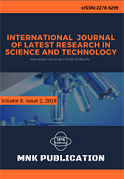DOI:10.29111/ijlrst ISRA Impact Factor:3.35, Peer-reviewed, Open-access Journal
Research Paper Open Access
International Journal of Latest Research in Science and Technology Vol.8 Issue 1, pp 17-20,Year 2019
Correspondence should be addressed to :
Received : 01 January 2019; Accepted : 19 February 2019 ; Published : 28 February 2019

| Download | 125 |
|---|---|
| View | 183 |
| Article No. | 10967 |
This paper presents the effects of termination condition on the performance of the genetic algorithm. Here operating system process scheduling problem is taken to analyze the effect of a termination condition. Scheduling in operating systems has a significant role in overall system performance and throughput. Efficient scheduling is vital for system performance. The scheduling is considered an NP-hard problem. In this paper, we use the power of the genetic algorithm to provide efficient process scheduling. the aim is to obtain an efficient scheduler to allocate and schedule the process to CPU. we will evaluate the performance and efficiency of the proposed algorithm using simulation results.
Copyright © 2019 Dr.Rajiv Kumar et al. This is an open access article distributed under the Creative Commons Attribution 4.0 International (CC BY 4.0) license which permits unrestricted use, distribution, and reproduction in any medium, provided the original work is properly cited.
Dr.Rajiv Kumar , " Effect Of Termination Condition On The Performance Of Genetic Algorithm ", International Journal of Latest Research in Science and Technology . Vol. 8, Issue 1, pp 17-20 , 2019

MNK Publication was founded in 2012 to upholder revolutionary ideas that would advance the research and practice of business and management. Today, we comply with to advance fresh thinking in latest scientific fields where we think we can make a real difference and growth now also including medical and social care, education,management and engineering.

We offers several opportunities for partnership and tie-up with individual, corporate and organizational level. We are working on the open access platform. Editors, authors, readers, librarians and conference organizer can work together. We are giving open opportunities to all. Our team is always willing to work and collaborate to promote open access publication.

Our Journals provide one of the strongest International open access platform for research communities. Our conference proceeding services provide conference organizers a privileged platform for publishing extended conference papers as journal publications. It is deliberated to disseminate scientific research and to establish long term International collaborations and partnerships with academic communities and conference organizers.